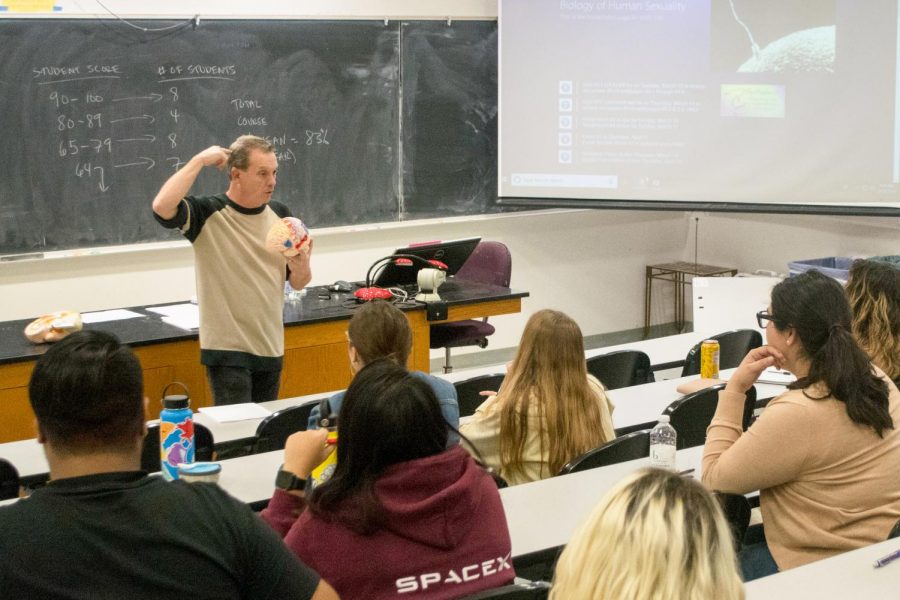City College Professor Blake Barron launched the college’s first Biology of Human Sexuality class nearly 20 years ago, and today it has flourished into an informative safe space for students. He truthfully answers any embarrassing or awkward questions his students might have about sexuality, something that other non-biology sexuality classes don’t offer.
The Channels interviewed Barron for a Q&A on some of the hot topics students are wondering about.
What inspired you to teach this class?
I was a reproductive physiologist by training, so I did both of my undergrad and graduate work at UCSB. So sex was my thing! When I got hired full-time at City College in 1998, after teaching for two years prior as part-time, there was already a human sexuality class. We are fortunate enough at City College to have three human sexuality courses. There’s one in the physical education department, the psychology department, and my class. And human sexuality is almost never taught from the biology perspective. When I took the course on, it was my baby. I redesigned the curriculum so that it would fit area 5B for IGETC.
What is the most memorable question asked in class?
As you can imagine, I’ve heard it all. You get the ones that clearly demonstrate that people need this course. Here’s one: ‘Can you become pregnant because of anal sex?’
What do general sex classes not cover?
The benefit you have here is if you took all three of those courses here at City College you’d know more than all the faculty on this campus! But generally, it’s not taught with the biological science perspective, it’s usually taught from more of a psycho-social perspective.
What is a common misconception about the class or the material taught in the class?
There’s a huge amount of mythology about human sexuality. One of my focal points in the course is to debunk those myths. I feel like part of my job is to help answer those questions they didn’t feel like they could get honest, scientifically evident, truthful answers to.
Do you think this class should be a requirement?
Yes. Yes, yes, yes, yes, yes. I think there should be a reinvigoration of the human sexuality curriculum at all levels of education.
How often should you get tested?
My recommendation to students is you need an annual physical exam with a doctor that you trust. Part of this is getting physical exams allows you the opportunity to develop a relationship with a clinician. Another thing it does is it sets the baseline of your body and the data associated with it.
What is the difference between an STD and an STI?
We’ve used the term STD from as early as the 1950s through today. The problem with that is the connotation of disease. It implies that it is absolutely chronic and is potentially incurable, and that’s not always the case. The more accurate and scientific description is ‘sexually transmitted infection’ because they’re all infections.
Can you get an STD from oral sex?
Yes. Many of them. The big concern is that you should be using a barrier, a condom for male oral sex or a dental dam. Or even keep a roll of saran wrap in your nightstand for female oral sex, because it’s larger and therefore prevents fluid transmission. There’s a significant increase in oral and throat cancers over the course of the last decade, mostly due to oral transmission of HPV.
What kind of protection is there for females?
When you break down contraceptive techniques, you have hormonal methods like pills and patches, that don’t provide any protection at all. And then you have barrier methods, like diaphragm caps, and male and female condoms. The female condom will also decrease your risk, but the male condom is a little bit better. Honestly, the best way to decrease your risk is having a nice conversation with someone before you have sex with them. Look, if you want to have better and safer sex, you need to know the person before you have sex with them— to some degree. Communication is really, really important.




![Milton Alejandro Lopez Plascencia holds a flag showcasing the United States and Mexico on Feb. 7 in Santa Barbara, Calif. “It’s heartbreaking to see what is happening all across the country,” Lopez Plascencia said. “I [want] my voice to be heard by the community.”](https://www.thechannels.org/wp-content/uploads/2025/05/MGSImmigration-1-1200x800.jpg)


![The new Dean of Social Science, Fine Arts, Humanities and English, Eric Hoffman beams on May 2 in Santa Barbara, Calif. "My major professor in college [inspired] me," Hoffman said. "You can really have a positive impact on people's lives in education."](https://www.thechannels.org/wp-content/uploads/2025/05/MGSHoffman-2-1200x800.jpg)







